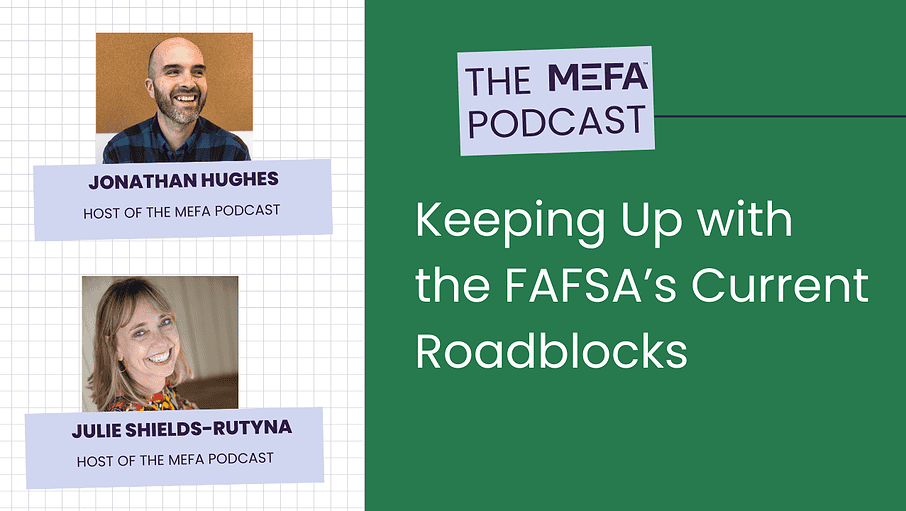

Resources Mentioned in this Episode
Jonathan Hughes: Welcome to the MEFA Podcast, everyone. My name is Jonathan Hughes.
Julie Shields-Rutyna: And I’m Julie Shields-Rutyna.
Jonathan Hughes: Julie, we have another FAFSA show for everybody. This is because the FAFSA has been available for one month now to one degree or another. And I think it’s fair to say that the launch of the new simplified FAFSA has been eventful, wouldn’t you say?
Julie Shields-Rutyna: I would say so, Jon. In fact, I think eventful is a generous way to put it.
Jonathan Hughes: Yeah, I thought that was a good way to put it. And, we know that there are all sorts of issues with the FAFSA rollout this year. We know that the form is still a work in progress. There have been fixes, there have been breakdowns and scheduled times where the form has been taken offline and all sorts of things that are still being ironed out. The form has met the public and there has been a bit of frustration.
Julie Shields-Rutyna: Yeah, and we’ve [00:01:00] been hearing a lot from families. We thought it would be a great service to families to go over some of these most popular questions and problems that folks have been running into. And just let people know where they are. We’ll give some solutions if we can, and perspective if we can’t. Speaking of which, we just completed our first FAFSA help event. We call it the FAFSA Festival and we had 300 plus people register for this event. And then, I don’t know I think the number is 107. We helped 107 families in that two hour period pairing them up with expert volunteers which was really great.
So we’re coming to understand the problems families are running into and we really understand how their anxious and frustrated. So we just want to be able to give families reassurance that this is someone across the board.
Jonathan Hughes: I really want to focus on some of the [00:02:00] known issues with the FAFSA because, when the FAFSA first came out, there was a big fuss about it not being available, this and that, and then as the form comes back on some people might think, okay, it’s all set now, but there are still problems with the form that families are running into, and there are problems that These are problems that, they’re known. What that means is that the federal government knows that it’s a problem.
You’re running into it. And the colleges know that these are problems. And they have no real fixes to them yet, so why are we even telling you about them? We just want you to know that if you do run into these problems, it’s, first of all, not because you did something wrong. Okay, so it’s not your fault.
Secondly, there’s nothing you can really do differently to fix it. So it’s not something that you can get around, but also know that everyone knows that these issues are issues, and they’re working to fix them. And so if you’re staring down a [00:03:00] deadline, communicate with the college and note your communication with them.
If you send them an email, make sure that you have that email. Make a call, note what they made the call, etc. So that you have those. But let’s run through some of these, shall we? So what should we point out, Julie?
Julie Shields-Rutyna: There’s an issue for parents who don’t have a social security number.
Jonathan Hughes: Yeah, and we should say that this is new this year, right? It used to be that parents without an SSN wouldn’t be able to get an FSA ID. So they wouldn’t be able to complete the FAFSA online. So they’d have to download a signature page, like sign a signature page and mail it in, which was not convenient.
And there was supposed to be a fix this year where the parents without an SSN would be able to get an FSA ID. And they would do this by answering sort of knowledge-based questions. Supplied by trans union.
Julie Shields-Rutyna: Yes. And we were very excited that a parent without a social security number was being brought right into the process to be able to do the form [00:04:00] online, get an FSA ID, all of that.
But the problem is, the process has not been perfected yet. And what we’re seeing is that if a parent doesn’t have a social security number and starts the 24-25 FAFSA for a student, they receive an erroneous message on the student information page, and it states something like the user is unauthorized to act on behalf of the student since they already have a 24-25 FAFSA form.
And that’s even if the student has not started the application. And then that parent is not able to contribute on the form, their information on the form, even if the student has already invited them to contribute. So that’s a big problem, and it is a known problem, and it needs to be fixed, but it’s not fixed yet.
Jonathan Hughes: So all those folks that are just waiting.
Julie Shields-Rutyna: Exactly. And then if there are married parents where one has a social security [00:05:00] number and one does not and they filed a joint tax return, they aren’t able to enter the parent without the social security number’s ITIN. And the ITIN number is the number that’s going to verify that parent is who they are.
And so that’s not really working right now either. And they’re supposed to be right when they go in, they’re supposed to be presented with a little box that they can check and then fill in that number and it’s not working anyway. Another issue is those without a social security number trying to create an FSA ID and if they can’t answer the trans union questions, let’s see, we’ve all found ourselves, answering credit questions online or something.
Then what they’re asking the family to do is they need to call federal student aid so that they can be verified and matched. And currently calling [00:06:00] FSA has huge, long wait times or applicants are just receiving a message that says there are too many callers, try back later. And sometimes they’re immediately disconnected.
Jonathan Hughes: Yeah, and that’s something that we’re hearing a lot about. They’re just swamped right now. There’s so many calls coming through. And that’s just going to be the case, in this type of circumstance. If they can’t fix these problems, what should they do?
Julie Shields-Rutyna: What we’re advising is they can take, take a screenshot just to show, so they know what. They can remember what they saw online at what date and just keep trying. But then you, families, students can keep in touch with the colleges they’re applying to, to just let them know what they’re experiencing. Although I will add in that lots and lots of students are doing that. So the colleges are getting those calls.
They’re very aware. But. Just keep trying. These bugs are being fixed on a daily and weekly basis. So we’re telling students to not panic. [00:07:00] This is a widespread, spread problem and keep trying. They can also go to studentaid.gov to keep informed about the fixes that are happening.
Jonathan Hughes: So that’s good to know. And it’s just, there’s not going to be a perfect solution for these things. FSA is swamped, colleges are swamped, people have deadlines, they can’t file a form. It’s just the way it is right now, but do your best and keep going. Most of the FAFSA issues that I run into, we talked about the FAFSA festival that we did last week, and I was on the one, Zoom room with the one gentleman for 90 minutes.
This is an example of that. Most of these issues. are not actually answering questions on the FAFSA, but they do regard the FAFSA process, like the, like getting your FSA ID and the process of actually filing, who starts it, who invites who, what happens if there’s a mistake. So can you actually just [00:08:00] get into a little, without getting too detailed here, what should the process be for filing the FAFSA?
Because not a lot of folks or not everybody knows who needs to start and how the process should go.
Julie Shields-Rutyna: Sure. It should go that the student gets an FSA ID. And for the student’s parents, if they are married and filed jointly, then one parent also needs an FSA ID. For parents who file separately, or not at all, both parents need an FSA ID.
For a family’s process, either two or three, FSA IDs need to be created. And that’s again, a username and password. So it’s it is crucial as you just alluded to Jon to get this part, right? So the parents should provide their name and social security number and date of birth And the students should set up their id with a different email address their own [00:09:00] name their own date of birth I did help someone who made a mistake here and went far into completing the form and then Couldn’t finish because now the FAFSA essentially has two IDs for the student instead of one.
So how you start is really important. And then you make sure each party’s FSA ID is correctly linked to that person. That, and the preferred method is that the student goes first and when they’re starting the FAFSA, the student goes in to start the FAFSA and then they complete their portion, including the signature, And then they invite the parent or parents.
And then the parent or parents go in and complete their portion and sign. And when the last person signs, then the whole form is submitted.
Jonathan Hughes: Let me say, too, logging in as a parent The first thing that they ask you is the student’s information, right? Yeah. I thought that was so people would get, [00:10:00] so I was helping somebody who was confused and they weren’t sure if they were entering in as the parent or the student and so I was unsure.
Now I have a question for you. We talk about how it’s ideal that the student starts and they invite the parent, etc. What happens if the parent starts or what happens if both start?
Julie Shields-Rutyna: Yeah, The way this system is set up, it’s supposed to be that either one could start the form first. It is supposed to work like that. So eventually, with this new FAFSA, that might be the way it is. We’re just finding that more of the problems are happening when the parent starts first versus the student. So we’re advising that the students start the process first. If the parent does start first, continue to go through and see how far you get, but you might experience a problem.
Jonathan Hughes: And I’ll be honest too, before we move on, because the next question, or the next thing we’re going to talk about are, after you’re finished filing, right? Which is the fastest [00:11:00] submission summaries. But before we say that, I’ve actually got a few, I’ve gotten a few questions about the actual form itself, filing it.
And I have to say, most of them have been thinking that people most of them have been people thinking that they needed to put things that weren’t asked. Essentially, why is it, why was it so short? So the form itself You know, it might be easy to chortle at FAFSA simplification, but the form itself actually is quite simple now, and people are, one of the other questions I got at a FAFSA Festival is, how come it’s not asking me about assets?
And I had to tell someone, they probably don’t need to know about your assets. That’s changed now. Things have gotten more generous that they’re requiring fewer people to even list their assets.
Julie Shields-Rutyna: And I agree with you, Jon. The families that I’ve spoken with who have been able to complete and submit the FAFSA have told me that [00:12:00] if they didn’t run into a problem, which a lot of people are, it took about 10 minutes because I’m Because they really have simplified this process. It’s just that it isn’t working perfectly for everyone.
Jonathan Hughes: Yeah. And so let’s get them to FAFSA submission summaries. And what happens after you go through the formula after you go through the form rather, and you are able to submit. What’s going on with the submission summaries and what are they and what’s going on with them?
Julie Shields-Rutyna: Yeah so actually, usually when you submit the FAFSA, then, you receive what’s called a FAFSA submission summary, and that’s a statement that gets sent to parents and students to let the family, no, the student, the parents that their FAFSA has been submitted successfully. Those have been delayed.
So it used to be called the student aid report, and people could expect that very soon after completing the FAFSA. But to date, nobody has received a FAFSA submission summary. How come? [00:13:00] Because the, the process is delayed. And so not only are the student and parents not receiving the FAFSA submission summary, but also colleges who in prior years received the information in a relatively short time after the family submits, they’re not receiving the information either.
So anyone who’s received, submitted a FAFSA is going to see that their FAFSA in process. And that means they’ve finished it, the federal government has it, but it has not been transmitted to the colleges yet. So this isn’t a reason to miss a school deadline though. You still want to file as soon as you can and the colleges can see when you filed. Even if they don’t have the information yet.
Jonathan Hughes: Now, one final problem in quotes that we want to talk about, because it’s probably more of a problem if you are, policy person or lawmaker or somebody who is involved with the rollout somehow [00:14:00] or the formula but not a problem for families, right?
Julie Shields-Rutyna: Yes, something else that’s happening is actually a good thing, but it’s adding to the delays and the issues is that due to an adjustment in the FAFSA formula there is an additional $1.8 billion in financial aid that students may be eligible to receive.
Jonathan Hughes: Tell everybody where that comes from.
Julie Shields-Rutyna: Yeah. So when the FAFSA is looking at income from the parents and students to determine what they can afford to pay and come up with a family student aid index they, the FAFSA form protects a certain amount of income. That’s, they don’t even look at that part and that what we call income protection allowance is supposed to increase with inflation, but due to all of these changes with the FAFSA, that didn’t happen this year. So the current formula in the FAFSA is [00:15:00] still looking at 2020 consumer price, inflation figures. And so that has to be adjusted in a positive way for families. And so that’s going to be adjusted.
And that means that more of a family’s income will be protected. So that’s terrific. That means more eligibility. For all kinds of financial aid, including Pell Grants. So that’s the good news that it’s going to happen. The bad news is that some families who have already filed a FAFSA and received a student aid index number that number might have to be adjusted.
And all of this may delay that information. Getting to the colleges a little bit and that’s what people are worried about right now.
Jonathan Hughes: Yeah, but this, but again, we should say if you have filed, right? [00:16:00] Yes. What should you do?
Julie Shields-Rutyna: Nothing. You don’t have to do anything. So that’s great. If you filed, wonderful.
And if you haven’t filed, file. Still keep trying to file. This is nothing that will really affect you. have to do anything about, but it’s just something to know that is a positive thing. And also to know that it’s not helping with all of the delays.
Jonathan Hughes: Oh, good message there, Julie. Let’s go to the MEFA Mailbag and these are questions that have come into us over the past week and been answered by one of our college planning team members. So remember, if you have any questions, you can reach out to us over email at [email protected] over the phone at 800 449 MEFA and on social media as well on Facebook at @MEFAMa, on X at @MEFATweets and on Instagram at @MEFA_MA. I feel bad. I gave you a lot of things to say already this week.
But this one’s a big one, okay? And it comes from a customer who writes. This is a good FAFSA question for you. “On the FAFSA [00:17:00] form, I checked the box for the IRS to get our financial information.” That’s question number one. Let’s stop there, Julie.. What is she referring to?
Julie Shields-Rutyna: Yes anyone who is completing the FAFSA, the student and parent or parents, has to check a box saying, I consent to have the IRS bring my financial, my tax information into the form. Which is a great thing. That’s going to keep this form simple.
Jonathan Hughes: So they got to do that or they won’t get aid. Okay. So she’s done that. “In our savings account, we have a sum of money from the sale of my husband’s parents house. The house was sold in 2023, and we had to put funds aside to see if we needed to pay capital gains tax on it.” are you with me, Julie?
Julie Shields-Rutyna: I am. I am.
Jonathan Hughes: For 2024. “We have an appointment with our accountant in March to find this out. If we don’t have to pay capital gains tax. It’ll be split between my husband [00:18:00] and three siblings.” Okay? You with me now? “With this being said, when the IRS looks at our account, it will show quite a bit of money.
However, that money is not all ours. My daughter checked her FAFSA application and received a notification that said that her SAI, our SAI, is $21,440. Based on the eligibility criteria, you don’t appear eligible for a federal Pell Grant. However, you may be eligible for other federal, state, or institutional grants. I’m assuming the FAFSA says we’re not eligible because of the funds set aside for capital gains tax.”
What a rich question this is, Julie. Yep. “The money is not all ours. It has to be split four ways. We can’t do that until we meet with our accountant to make sure no capital gains tax needs to be paid. How do I relay all of this to the people at work?”
Julie Shields-Rutyna: Yep. All right. I got it. You got it. I do. See [00:19:00] the issue is that the FAFSA is, is somewhat simple. Once you get it done, and so it’s going to bring in that tax information from 2022, and it’s going to calculate a number, the student aid index for the family. And that’s just going to happen and you don’t, just, need to go back to FAFSA and let them know anything different because that’s how FAFSA calculates based on that income tax return but you will want to let the college know the college that your student is going to go to or even all of the colleges that your student applied to you will want to let them know because this is a circle, a special circumstance where your financial situation today is is different from how it was in 2022 when that money was in your account.
So you will just want to write a letter, an email, something [00:20:00] explaining to the college or colleges what that situation is. You might want to wait until. You’re sure what it is because if you’re not sure the college will say you need to get back to us and let us know what your actual situation is.
So once the situation is clear, then you write to the college, let them know what’s happening and they will make some adjustments to your file. The more specific you can be with actual dollars, the better that is. And, but all I’ll say is also people worry when they get that message that says based on eligibility criteria, you don’t appear to be eligible for a federal Pell Grant. People get nervous that means they won’t get anything. That’s just talking about one program. And so that’s why that second part of that notice, however, you may be eligible for other federal, state, and institutional grants. So this family right now may even be eligible for a lot of financial aid.
So don’t let that [00:21:00] one statement that says you may not be eligible for a Pell Grant worry you. But yes, please update the financial aid office as soon as you can on that situation. So they will have the most accurate information to be able to give you the best financial aid offer that they can.
Jonathan Hughes: You did it. You made it look easy again, Julie. Thank you so much. Remember if you have any questions regarding planning, saving, college, or career training please let us know. We have a bench of college guidance experts waiting to offer free assistance. I’ll give that information again over email.
That’s [email protected]. Over the phone, that’s 800-449-MEFA, and our social media information is Facebook at @MEFAMA, on X at @MEFATweets and Instagram, @MEFA_MA. Now, before we wrap up the show, so we can wrap it up all nice and neat and in a bow here, what’s the overall [00:22:00] message that we want to leave parents with?
Parents and families and students who are maybe stressed out, who are trying to file a FAFSA, who have not been able to do it so far, or are scared off.
Julie Shields-Rutyna: Yes, I would say if you haven’t been able to file the FAFSA because of one of the issues we mentioned here, or for some other reason, take screenshots of the messages you’re getting so you have documentation showing that you’ve been trying, and then let any colleges know Any colleges you’re applying to know that you haven’t been able to submit the FAFSA and explain why.
You can include those screenshots. And just know that colleges are involved in all of this as well. Very much aware. And they will be very understanding because they know that the FAFSA has had so many issues. If you haven’t been able to get through to Federal Student Aid, just keep trying.
And these [00:23:00] issues will eventually get resolved. And it might just take some time. So as much as it’s very stressful, just be patient and persevere. Keep calm and follow your FAFSA.
Jonathan Hughes: All right. That about wraps it up for us today. And if you liked it, you heard today and you want to know more about planning, saving and paying for college and career readiness. You can follow the show wherever you get your podcasts, and please remember to review us because it does help us to keep doing what we’re doing getting the show out to folks like you. So Julie, thank you once again. Thank you for the heavy lift this week.
Julie Shields-Rutyna: No, thank you, Jon. I also want to thank Shaun Connolly, our producer. I want to thank Lisa Rooney and AJ Yee for their assistance in getting the show posted. Once again, my name is Jonathan Hughes, and this has been the MEFA Podcast.












